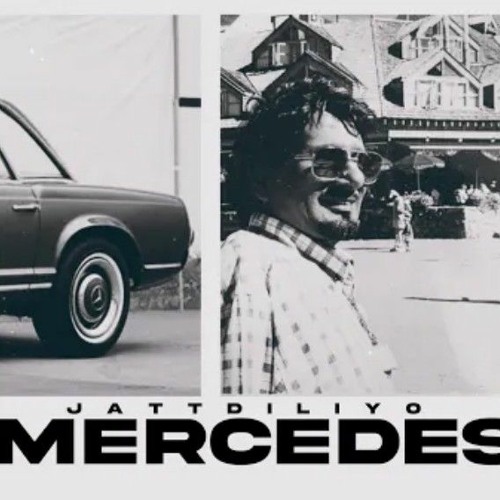on
Guns, Gabru, Gaga
Punjabi music has come a long way from the days of Daler Mehndi to Siddhu Moose Wala. For me, the present-day voice of Punjabi music “clicked” when I heard Amrit Mann’s song, Difference and looked up its lyrics. In Difference, the first few lines go:
Munda malwayi goriye
Charche sade Mississauga
Suneya jine manak howe
Nai sunda Lady Gaga,Hey girl, the guy is from Malwa,
But famous even in Mississauga
One who listens to Kuldeep Manak’s music
Never listens to Lady Gaga
First, the connection to Mississauga. I find it amazing that the name of a Canadian city can be used with the expectation that most listeners will get the context.
Next, the reference to Manak i.e. Kuldeep Manak, led me down a rabbit hole of Punjabi folk songs. One of his songs is called Jatt Di Mercedes. While looking up this song, I found a recent remix of it by an artist called Tyni. Check out the cover art of these two songs:


Now the thing to note here is the idea of the Mercedes both the songs allude to. The original version features a truck, the OG Mercedes of the Jatt. For the present generation of Punjabis, the Mercedes (or Mustang or Camaro) featured in music videos is a sign of their prosperity.
The next few lines of Difference call out the masculinity element in Punjabi songs. There are Hellcats, “asli mard” and mehnat. One such instance:
Rakhe jine chele chapte
Asli oh mard hi haini
Sadi vocabulary wich
Failure word hi hainiThe one who keeps sidekicks with him is not a real man
There is no word called failure in my vocabulary
There has been a lot of discussion around violence in Punjabi music. There also have been efforts to censor it. Lyrics often mention guns by types and brands, like in this Amrit Mann song called Combination. The sound of gunshots punctuates lyrics like:
Ho 5-5 lakh de suit rakane
Badal badal ke pauni ae
Dashboard te mauser rakh ke
Town da gehda launi aeSuits worth 5,00,000
Girl you keep changing into
You keep the Mauser (gun) on the dashboard
And roam all over town
One of the poster boys of the usage of violence in Punjabi music was the legendary Punjabi music star Siddhu Moose Wala. I have heard many of his songs and while I am not a great fan of guns or violence references, I think he was at the peak of his creative form when he was gunned down in May this year.
Particularly, I want to mention two of his songs. First, this song called Sanju. This song was released by Siddhu Moose Wala after he got out on bail following his arrest for possession of firearms. A video of him using an AK-47 went viral during the lockdown. In the song, he compared his situation to that of Sanjay Dutt and he highlights the similarities in both arrests by using audio from news clips of Sanjay Dutt’s arrest in his song.
Ho aunde somvar aa tareek sohniye
Bail wale chance vi weak sohniye
Nikalde saare hi gift deunga
Laddu jehde vand de shareek sohniye
Bachne ne jehda mere vair khattdeMy court date is on coming Monday
Chances of getting a bail are pretty weak
As soon as I get out I will gift
Those distributing sweets (i.e. are happy about his jail term)
My enemies can’t escape my wrathHo gabru te case jehda Sanjay Dutt te
Jatt utte case jehda Sanjay Dutt te
Chobar te case jehda Sanjay Dutt te hayeThat guy/Jatt/young man has been accused of the same crime as Sanjay Dutt
Next, is his song called SYL, released posthumously in June 2022. The SYL in the name of the song refers to the Sutlej Yamuna Link project. This piece in The Wire, talks more about the controversy around the song leading to it being censored and unavailable for streaming:
In his typical bold style and catchy lyrics, Moosewala, in the song, questioned Punjab’s long-standing historical and political issues – the controversy surrounding the SYL canal; the victims of 1984 anti-Sikh riots; Sikh militants; Sikh prisoners languishing in jails despite the completion of their terms; and Sikh activist Balwinder Singh Jattana, whose name became synonymous with bringing the construction of the SYL canal to a halt on July 23, 1990.*
Allusions to political happenings in Punjabi music were also prominent during the Farm Protests last year. In response to the pushback around Rihanna’s support of the Farmers’ Protests, Diljit Dosanjh recorded and released a song called RiRi.
What is it about Punjabi music and musicians that their music is commercially successful while taking political and social stands that something like Hindi film industry music is unable to do? What would be the long-term effect of such influences in today’s Punjab with drug abuse and violence cases on the rise? While you think about all of this here is a Spotify Playlist to play alongside: